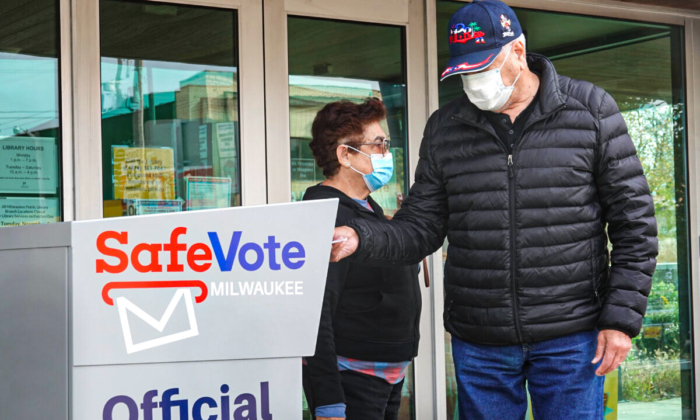Wisconsin state Assemblywoman Janel Brandtjen, a Republican, worries that not enough has been done to prevent the upcoming midterm election from becoming a replay of 2020.
“Going into the midterms, a person can still register, get a ballot, and vote before his or her identity and address are verified with the Wisconsin Department of Transportation, as required by law,” Brandtjen told The Epoch Times. “I saw this going on in the August primary. Nothing has changed since 2020. There is still no instantaneous identity check for the thousands of people utilizing Wisconsin’s same-day registration law.
“There remains continuing opportunity for bad actors to take advantage of this and other security vulnerabilities in the balloting process.”
According to law, local clerks have 30 days after a state election and 45 days after a federal election to verify a same-day voter’s ID and address.
“What good does that do? By that time, the election is already over, and there is no way to take a potentially illegal vote back or to link the ballot with the unqualified voter who cast it,” she said. “This is not the fault of the local election clerks. They have not been provided the equipment they need, nor is there a process in place for an instant identity check for same-day registrants who vote that day.

“The Wisconsin election system has a poor balancing process and is very bad about removing any names from the voter rolls. Many of these problem names and addresses are likely still on the rolls.”
The Wisconsin Legislative Audit Bureau documented the size of the 2020 problem in a report published in October 2021.
The audit discovered that the identity and address information of more than 46,000 same-day voting registrants didn’t match the information in the Wisconsin Department of Transportation (DOT) database.
Brandtjen said some of these may be explainable by things such as spelling errors, but the sheer number discovered is cause for concern.
“It also doesn’t change the fact that the errors that were caught were found after the person voted,” she said.
According to the audit, in the case of 13,800 people, “no attempt was made to match the information.”
The audit stated that the Wisconsin Elections Commission (WEC) offered several technical reasons why it made no attempt to match the identity and address of 13,800 would-be voters with DOT records, explaining that it was, in part, due to some of them being “in the military.”
According to the website Governing: The Future of States and Localities, in September of 2021, Wisconsin had 1,034 people on active duty in the U.S. military.
The audit revealed that a total of nearly 60,000 would-be voters appeared before municipal election officials, asked to be registered, and received a ballot without their names and addresses being verified with the DOT database until after the election or not at all.
Brandtjen said the WEC ignored her letter about the audit’s findings and recommendations.
According to the audit, nearly 960,000 people registered to vote in 2020, either online, in person, or by mail.
Of the 960,000 new registrants, nearly 94 percent of them presented identity and address information that matched the DOT database.
“That is no doubt the case, but the problem is centered on the lack of an in-person, same-day register and vote verification procedure,” election integrity watchdog Peter Bernegger told The Epoch Times. “The responsibility lies squarely on WEC, which has done nothing to fix this gaping hole in the security of Wisconsin elections.
“Going into next month’s midterm election, nothing has changed. There is still no system in place to do an instant identity verification like what we see at our airports, party stores, and bars.”

Bernegger alleged that some unverifiable names and addresses of people who received ballots weren’t discovered until five weeks after the 2020 election.
“By then the damage was already done,” he said.
Bernegger said WEC’s failure to implement an instantaneous verification system for the names and addresses of same-day registrants serves the political interests of the Democrat Party.
To determine the extent of the alleged abuse, he applied the state’s 90 percent voter turnout rate in the 2020 presidential election to the number of belatedly verified and unverifiable registrants flagged in the audit.
“Through that calculation, we estimate that 53,500 people were likely to have voted without verification of their names and addresses. And it’s possible for them to do it again,” Bernegger said.
Challenger Joe Biden defeated President Donald Trump by less than 21,000 votes in Wisconsin in 2020.
After the August primary, Bernegger filed a formal complaint with the Wisconsin Elections Commission alleging that its director, Meagan Wolfe, and all six commissioners (three Republicans and three Democrats) neglected their sworn duty by not implementing an instant identity check system for same-day registration voting.
WEC officials didn’t respond to a request from The Epoch Times for comment.
On Sept. 7, WEC returned Bernegger’s complaint “without consideration or dismissal by the Commission.”
In a letter to Bernegger, WEC recused itself and referred Bernegger to the circuit court, claiming that it would be unethical to adjudicate a complaint against itself.
“As a Wisconsin voter who had to have my identity and address match the DOT database before I voted, I believe my 14th Amendment rights of equal protection and due process have been violated by WEC’s willful and selective omission of this requirement in the case of same-day voters,” he told The Epoch Times. “I am seeking legal counsel to fight for my rights in court.”

